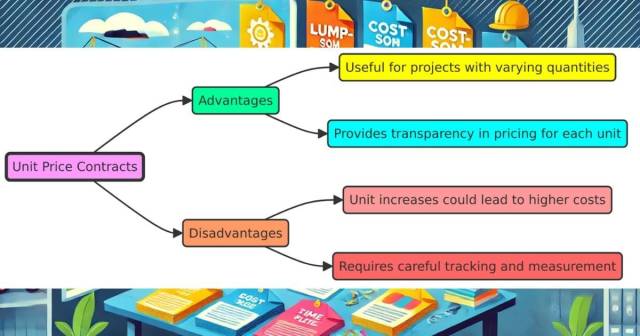In the construction industry, contracts serve as the foundation for successful project execution. They outline the responsibilities, expectations, timelines, and payment terms for all parties involved. Choosing the right type of construction contract is crucial to ensure that the project runs smoothly and that everyone, from contractors to owners, knows their roles and obligations. In this blog, we will explore the different types of construction contracts, highlighting their features and helping you understand which might be most suitable for your project.
What is a Construction Contract?
A construction contract is a legally binding agreement between two or more parties that details the terms under which a construction project will be completed. It typically includes provisions about the scope of work, project timeline, payment structure, and any potential penalties for delays or disputes.
Types Of Construction Contracts

1. Lump Sum Contracts (Fixed Price Contracts)
A lump sum contract is one of the most straightforward types of construction contracts. In this agreement, the contractor agrees to complete the project for a fixed total price. This price includes all costs such as labor, materials, and profit.

- Advantages:
- The owner knows the exact cost upfront.
- The contractor is incentivized to complete the project efficiently.
- Easy to manage for both parties as the scope and payment are predefined.
- Disadvantages:
- Changes or additions (change orders) to the scope can result in additional costs.
- The contractor bears the risk of any cost overruns.
Lump sum contracts are ideal for projects with well-defined scopes where the likelihood of significant changes is minimal.
2. Cost-Plus Contracts
In a cost-plus contract, the contractor is reimbursed for the actual cost of the project (materials, labor, etc.) plus an additional fee for overhead and profit. This type of contract is common when the project scope is not fully defined at the start.

- Advantages:
- Flexible for projects with uncertain scope or design.
- Ensures that the contractor is compensated for all legitimate costs.
- Disadvantages:
- The total project cost is uncertain for the owner.
- It requires detailed documentation of expenses, which can complicate project management.
Cost-plus contracts are beneficial for complex projects where unforeseen issues may arise, or the final design is not yet complete.
3. Time and Materials Contracts
A time and materials contract is based on the actual time spent and materials used for the construction project. The contractor charges for labor at an agreed-upon hourly or daily rate, along with the cost of materials. This contract is often used when the project scope is unclear, and work needs to start before the design is finalized.

- Advantages:
- Flexibility to adjust for unforeseen changes or additions.
- The owner pays for actual work completed and materials used.
- Disadvantages:
- The final cost can become unpredictable, as it depends on the time and materials used.
- Contractors may lack incentives to complete the project quickly.
Time and materials contracts are typically suitable for projects that require flexibility and ongoing adjustments.
4. Unit Price Contracts
A unit price contract breaks down the project into individual units, such as square footage of paving, tons of concrete, or hours of labor. The contractor provides a price per unit, and the total project cost is determined by the number of units completed.

- Advantages:
- Useful for projects where quantities may vary.
- Provides transparency in pricing for each unit of work.
- Disadvantages:
- If the number of units increases significantly, it could lead to higher-than-expected costs.
- Requires careful tracking and measurement of units.
Unit price contracts are often used in civil engineering or infrastructure projects, where the exact quantity of work may be uncertain.
5. Incentive Contracts
An incentive contract rewards the contractor for completing the project under budget or ahead of schedule. It is often used for large-scale projects where efficiency and meeting deadlines are critical.

- Advantages:
- Encourages contractors to work faster and more cost-effectively.
- Can lead to cost savings for the owner.
- Disadvantages:
- The focus on speed may compromise quality.
- It can be challenging to set fair incentives that motivate without cutting corners.
Incentive contracts are ideal for projects with tight deadlines or significant budget constraints.
6. Guaranteed Maximum Price (GMP) Contracts
A Guaranteed Maximum Price (GMP) contract sets a maximum price that the owner will pay for the project. The contractor is responsible for any cost overruns beyond this amount unless the scope of the project changes.

- Advantages:
- Limits the owner’s financial exposure.
- Provides flexibility for changes within the maximum price.
- Disadvantages:
- The contractor may build in a contingency, inflating the initial price.
- Any scope changes may void the GMP, leading to increased costs.
GMP contracts are typically used for large projects where the owner wants to mitigate the risk of cost overruns.
Conclusion🎯
Choosing the right type of construction contract is essential for ensuring that the project proceeds smoothly and stays within budget and on schedule. The type of contract selected depends on several factors, including the scope of the project, budget flexibility, and the level of certainty in the design. Whether it’s a lump sum contract for a straightforward project or a cost-plus contract for more complex work, understanding the different types of construction contracts will help you make an informed decision.
